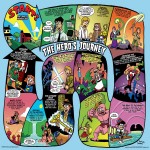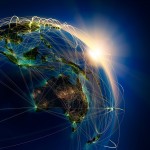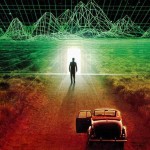 Enlightenment. The moment we consciously connect to eternal truth. It’s when we see through the veil of this illusionary world, rising above ego, time, materialism, and our own emotions to see the bigger picture—that we are all one. It’s what all gurus, spiritualists, yogis, Buddhists, monks, meditators, shamans, artists, writers, and religious leaders strive for. It’s the state Neo reached at the end of The Matrix, the level Dorothy attained so she could surpass time and space and return home, and the brief moment you get a taste of, usually in the shower, when your brain skips a beat on the record of reality, resulting in a little inspiration in line with your true self. But is there any way to speed up the process or at least know how close you are to the fully enlightened experience? I believe there is. And it’s something so unbelievably simple, you’ll be able to master it shortly after reading this blog posts.
Enlightenment. The moment we consciously connect to eternal truth. It’s when we see through the veil of this illusionary world, rising above ego, time, materialism, and our own emotions to see the bigger picture—that we are all one. It’s what all gurus, spiritualists, yogis, Buddhists, monks, meditators, shamans, artists, writers, and religious leaders strive for. It’s the state Neo reached at the end of The Matrix, the level Dorothy attained so she could surpass time and space and return home, and the brief moment you get a taste of, usually in the shower, when your brain skips a beat on the record of reality, resulting in a little inspiration in line with your true self. But is there any way to speed up the process or at least know how close you are to the fully enlightened experience? I believe there is. And it’s something so unbelievably simple, you’ll be able to master it shortly after reading this blog posts.
 When you’ve seen as many movies as I have, you begin to see that they all follow a certain pattern. This is true not just of movies, but of all great stories ranging from those found in classic mythology and literature to modern TV series and video games. Joseph Campbell called it the monomyth or hero’s journey. It’s basically a series of steps that the protagonist must go through during the course of his or her adventure. In addition to this, there are also a number of spiritual principles that often find their way into storytelling. By combining these principles with the monomyth, you can pretty much figure out where just about any story is headed. While this skill has proven to be incredibly annoying to my wife, it’s come in very handy for me. Not because I’ve continually annoyed her with my usually correct movie and TV show predictions, but because I’ve noticed that these storytelling rules apply to more than just fictitious stories. They also apply to real life.
When you’ve seen as many movies as I have, you begin to see that they all follow a certain pattern. This is true not just of movies, but of all great stories ranging from those found in classic mythology and literature to modern TV series and video games. Joseph Campbell called it the monomyth or hero’s journey. It’s basically a series of steps that the protagonist must go through during the course of his or her adventure. In addition to this, there are also a number of spiritual principles that often find their way into storytelling. By combining these principles with the monomyth, you can pretty much figure out where just about any story is headed. While this skill has proven to be incredibly annoying to my wife, it’s come in very handy for me. Not because I’ve continually annoyed her with my usually correct movie and TV show predictions, but because I’ve noticed that these storytelling rules apply to more than just fictitious stories. They also apply to real life.
 Ah, the enlightened life! A life where the superficial trappings of the material world have lost their luster. Where greasy, fried, and fatty foods are no longer tempting. Where meditation, sharing, and an appreciation of the beauty of nature provide all the fulfillment one needs for true happiness. And yet, considering how healthy, content, and self-fulfilled spiritual people claim to be, why are they plagued with so many health, wealth, and happiness issues? Is poverty a requirement of enlightenment? Is self-indulgence selfish? Is self-love a sign of an inflated ego? The irony is that most spiritual people are just as egotistical as materialistic people—perhaps even more so since they believe themselves to be so far above everyone else. Sacrifice and ascetic behavior do not make one spiritual. Denying the material for the sake of the spirit misses the big picture. To be truly fulfilled, one needs to embrace both of these worlds, creating more than a holy life, but a wholly life.
Ah, the enlightened life! A life where the superficial trappings of the material world have lost their luster. Where greasy, fried, and fatty foods are no longer tempting. Where meditation, sharing, and an appreciation of the beauty of nature provide all the fulfillment one needs for true happiness. And yet, considering how healthy, content, and self-fulfilled spiritual people claim to be, why are they plagued with so many health, wealth, and happiness issues? Is poverty a requirement of enlightenment? Is self-indulgence selfish? Is self-love a sign of an inflated ego? The irony is that most spiritual people are just as egotistical as materialistic people—perhaps even more so since they believe themselves to be so far above everyone else. Sacrifice and ascetic behavior do not make one spiritual. Denying the material for the sake of the spirit misses the big picture. To be truly fulfilled, one needs to embrace both of these worlds, creating more than a holy life, but a wholly life.
 For years leading up to 2012, spiritual-types who were sick of the way the world was heading could take comfort in the promise of a new era that was predicted to begin on December 21 of that year. The Mayans, known for their astronomical expertise had supposedly predicted it. In addition, St. Malachy’s famous Prophecy of the Popes, which predicts when the world as we know it would end, also correlates to about the same time period. The Hopi tribe, Edgar Cayce, a book attributed to Nostradamus, hell, even The History Channel’s countless specials all pointed towards 12/21/12 as the beginning of the end times. The details differed, but whether you believed that Earth was due for a major cataclysm, a spiritual awakening, a religious reckoning and rapture, an alien visitation, a new dimension, or just an enlightened age, most people seemed somewhat excited that a major event was on the horizon. When the day finally arrived, we instead got something that came as a shock to many: absolutely nothing. Or so it would seem.
For years leading up to 2012, spiritual-types who were sick of the way the world was heading could take comfort in the promise of a new era that was predicted to begin on December 21 of that year. The Mayans, known for their astronomical expertise had supposedly predicted it. In addition, St. Malachy’s famous Prophecy of the Popes, which predicts when the world as we know it would end, also correlates to about the same time period. The Hopi tribe, Edgar Cayce, a book attributed to Nostradamus, hell, even The History Channel’s countless specials all pointed towards 12/21/12 as the beginning of the end times. The details differed, but whether you believed that Earth was due for a major cataclysm, a spiritual awakening, a religious reckoning and rapture, an alien visitation, a new dimension, or just an enlightened age, most people seemed somewhat excited that a major event was on the horizon. When the day finally arrived, we instead got something that came as a shock to many: absolutely nothing. Or so it would seem.
 Ever since Darwin published his infamous On the Origin of the Species in 1859, science and theology have been at war over the theory of evolution. The irony is that evolution and all its aspects—natural selection, survival of the fittest, genetic mutations—all appear in the Bible as clear as day. In fact, even the missing link of the explanation that science has still not uncovered appears in there as well. Is it found in some lost book, obscure passage, cryptic verse, or esoteric translation? No, it appears in an entire story that everyone knows—the story of Noah’s Ark. And once I point out the metaphoric meaning of the story, you’ll wonder how on earth you never noticed it before. How? The church didn’t want you to notice. Because the truth takes power away from them and puts it where it rightfully belongs—to you.
Ever since Darwin published his infamous On the Origin of the Species in 1859, science and theology have been at war over the theory of evolution. The irony is that evolution and all its aspects—natural selection, survival of the fittest, genetic mutations—all appear in the Bible as clear as day. In fact, even the missing link of the explanation that science has still not uncovered appears in there as well. Is it found in some lost book, obscure passage, cryptic verse, or esoteric translation? No, it appears in an entire story that everyone knows—the story of Noah’s Ark. And once I point out the metaphoric meaning of the story, you’ll wonder how on earth you never noticed it before. How? The church didn’t want you to notice. Because the truth takes power away from them and puts it where it rightfully belongs—to you.
 “We’re all connected.” It’s the ubiquitous mantra of new-agey types. Chances are if you’ve ever watched Oprah, were a fan of the TV show Lost, or have read just about anything I’ve written, you are very familiar with this concept. Along with its close cousin “everything happens for a reason,” it’s pretty much become a cliché that isn’t really given much thought. Yet, how exactly are we all connected? Sure, we’re all made of the same elements, live on the same planet, and are plugged into the same Internet, but the phrase usually refers to the idea that all of our minds are somehow connected, that our lives are intertwined, that actions taken by you, now, could somehow affect a struggling shoe salesman living in Uzbekistan. I think it’s about time we explored this concept and saved it from the nether regions of trite, hackneyed banality. After all, if the idea that “we’re all connected” is a given, why doesn’t anyone (with the possible exception of Oprah herself) really believe it?
“We’re all connected.” It’s the ubiquitous mantra of new-agey types. Chances are if you’ve ever watched Oprah, were a fan of the TV show Lost, or have read just about anything I’ve written, you are very familiar with this concept. Along with its close cousin “everything happens for a reason,” it’s pretty much become a cliché that isn’t really given much thought. Yet, how exactly are we all connected? Sure, we’re all made of the same elements, live on the same planet, and are plugged into the same Internet, but the phrase usually refers to the idea that all of our minds are somehow connected, that our lives are intertwined, that actions taken by you, now, could somehow affect a struggling shoe salesman living in Uzbekistan. I think it’s about time we explored this concept and saved it from the nether regions of trite, hackneyed banality. After all, if the idea that “we’re all connected” is a given, why doesn’t anyone (with the possible exception of Oprah herself) really believe it?
 Those who move in spiritual circles often talk about how we are all connected, that our thoughts create our future reality, and that the universe provides us with clues about our direction in life. Personally, I look at spiritual principles as scientific rules that we just don’t understand yet. Not too long ago, the idea that people could get sick from tiny bugs they couldn’t see or that invisible waves could carry images or music was thought to be magical thinking, until science proved it to be true. So if these spiritual principles are indeed a rule of our universe, there should be a way to test and predict their occurrence. Doing this on an individual scale might prove challenging though, since one person’s thoughts may not have enough energy to make something manifest in a testable way. But what if there were an event that millions of people were focusing on, and this event inspired heated, emotionally charged thoughts that could result in only one of two possible outcomes? If only we had such an event, why, we just might be able to predict the future on a grand scale!
Those who move in spiritual circles often talk about how we are all connected, that our thoughts create our future reality, and that the universe provides us with clues about our direction in life. Personally, I look at spiritual principles as scientific rules that we just don’t understand yet. Not too long ago, the idea that people could get sick from tiny bugs they couldn’t see or that invisible waves could carry images or music was thought to be magical thinking, until science proved it to be true. So if these spiritual principles are indeed a rule of our universe, there should be a way to test and predict their occurrence. Doing this on an individual scale might prove challenging though, since one person’s thoughts may not have enough energy to make something manifest in a testable way. But what if there were an event that millions of people were focusing on, and this event inspired heated, emotionally charged thoughts that could result in only one of two possible outcomes? If only we had such an event, why, we just might be able to predict the future on a grand scale!
 Back in June 2009, I wrote an article titled “Proof That We’re Living a Life of Illusion.” In it, I provided what I felt was overwhelming evidence that we all live in some kind of computer simulation. I also offered some simple explanations as to why I thought we did. At the time, the people who are open to believing in such fantastical theories excitedly agreed with the premise, while those who rely on hard-core scientific proof, did not. Well, a funny thing’s happened in the years since I wrote that article. Scientists are beginning to see the evidence that the non-believers require. The question now is, whether those skeptics will decide to take the blue pill or the red pill?
Back in June 2009, I wrote an article titled “Proof That We’re Living a Life of Illusion.” In it, I provided what I felt was overwhelming evidence that we all live in some kind of computer simulation. I also offered some simple explanations as to why I thought we did. At the time, the people who are open to believing in such fantastical theories excitedly agreed with the premise, while those who rely on hard-core scientific proof, did not. Well, a funny thing’s happened in the years since I wrote that article. Scientists are beginning to see the evidence that the non-believers require. The question now is, whether those skeptics will decide to take the blue pill or the red pill?
 There is certainly no shortage of theories about what may or may not happen on December 21. Of course, nearly all of them will turn out to be wrong. My experience has shown however, that there is one thing you can do that will likely be beneficial regardless of what’s in store for us: think positive.
There is certainly no shortage of theories about what may or may not happen on December 21. Of course, nearly all of them will turn out to be wrong. My experience has shown however, that there is one thing you can do that will likely be beneficial regardless of what’s in store for us: think positive.
 Let me guess, you don’t have time to read this right now, do you? Yes, the holiday season is always busy and yes time seems to go faster as you get older but doesn’t life seem to be moving at an even more frantic pace than usual lately? I know I’m feeling it. But I’ve been expecting this time crunch for a while now, so it may be a bit easier for me to deal with. Since I tend to be pretty sensitive about this stuff, what I wasn’t sure about was whether others would be able to pick up on it too. In the last few weeks however, I’ve heard at least fifteen different people exclaim in near shock about how fast time’s been going lately. And this without my even bringing it up! So, what’s going on? Can time really be going faster? If so, how much faster can it go before we can no longer keep up? And what then? Are we literally running out of time?
Let me guess, you don’t have time to read this right now, do you? Yes, the holiday season is always busy and yes time seems to go faster as you get older but doesn’t life seem to be moving at an even more frantic pace than usual lately? I know I’m feeling it. But I’ve been expecting this time crunch for a while now, so it may be a bit easier for me to deal with. Since I tend to be pretty sensitive about this stuff, what I wasn’t sure about was whether others would be able to pick up on it too. In the last few weeks however, I’ve heard at least fifteen different people exclaim in near shock about how fast time’s been going lately. And this without my even bringing it up! So, what’s going on? Can time really be going faster? If so, how much faster can it go before we can no longer keep up? And what then? Are we literally running out of time?
 Enlightenment. The moment we consciously connect to eternal truth. It’s when we see through the veil of this illusionary world, rising above ego, time, materialism, and our own emotions to see the bigger picture—that we are all one. It’s what all gurus, spiritualists, yogis, Buddhists, monks, meditators, shamans, artists, writers, and religious leaders strive for. It’s the state Neo reached at the end of The Matrix, the level Dorothy attained so she could surpass time and space and return home, and the brief moment you get a taste of, usually in the shower, when your brain skips a beat on the record of reality, resulting in a little inspiration in line with your true self. But is there any way to speed up the process or at least know how close you are to the fully enlightened experience? I believe there is. And it’s something so unbelievably simple, you’ll be able to master it shortly after reading this blog posts.
Enlightenment. The moment we consciously connect to eternal truth. It’s when we see through the veil of this illusionary world, rising above ego, time, materialism, and our own emotions to see the bigger picture—that we are all one. It’s what all gurus, spiritualists, yogis, Buddhists, monks, meditators, shamans, artists, writers, and religious leaders strive for. It’s the state Neo reached at the end of The Matrix, the level Dorothy attained so she could surpass time and space and return home, and the brief moment you get a taste of, usually in the shower, when your brain skips a beat on the record of reality, resulting in a little inspiration in line with your true self. But is there any way to speed up the process or at least know how close you are to the fully enlightened experience? I believe there is. And it’s something so unbelievably simple, you’ll be able to master it shortly after reading this blog posts.









